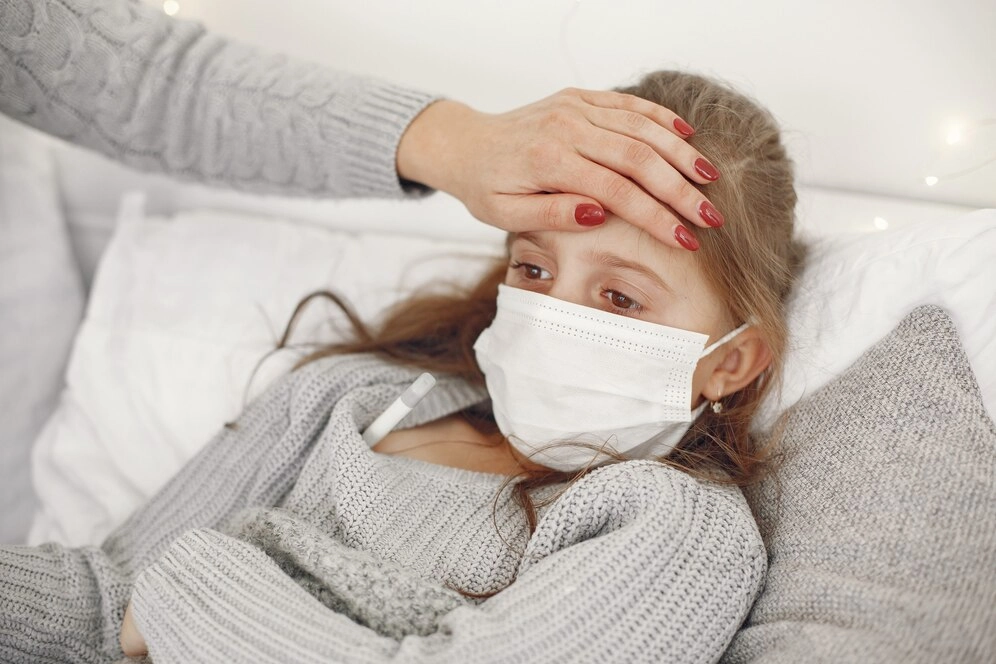How Can I Boost My Child’s Immunity During The Monsoon?
Category: General medicine
The monsoon season brings relief from summer’s heat, but it also creates conditions that allow bacteria, viruses, and mosquitoes to thrive. Children, with their still-developing immune systems, are more vulnerable to cough, cold, fever, stomach infections, and skin allergies during this season.
As a parent, your goal is to strengthen your child’s natural defenses so their body can fight off seasonal illnesses. With the right diet, hygiene, sleep, and care, you can make a big difference. Let’s look at effective ways to boost your child’s immunity during the monsoon.
1. Provide a Balanced Diet Rich in Nutrients
A nutritious diet is the foundation of strong immunity. During the monsoon, it’s important to focus on fresh, home-cooked meals that are safe from contamination. Include Vitamin C-rich foods like oranges, guava, amla, and lemons to help fight infections. Vegetables like carrots, spinach, and bottle gourd supply important vitamins and minerals. Pulses, lentils, eggs, and paneer provide protein that supports growth and repair. Avoid raw salads and cut fruits from outside vendors, as these can carry harmful bacteria. Opt for light, cooked dishes that are easy to digest and keep your child’s energy levels stable.
2. Keep Your Child Hydrated
Cooler weather often means children drink less water, but hydration remains crucial. Water helps flush out toxins, supports digestion, and keeps organs functioning well. Always provide boiled and cooled water during the monsoon to prevent waterborne diseases. Encourage your child to drink 6–8 glasses daily. To make it more appealing, you can offer fresh coconut water, lemon water, or mild homemade soups. Herbal teas like tulsi or ginger tea (in child-friendly amounts) can also support immunity and soothe the throat.
3. Practice Good Hygiene Habits
Monsoon illnesses spread quickly due to dampness and poor sanitation. Teaching your child proper hygiene is one of the easiest ways to prevent infections. Encourage them to wash hands thoroughly before eating, after using the washroom, and after returning from outside. Keep their nails trimmed to avoid dirt accumulation. Make sure they bathe daily, especially if they get wet in the rain, and change into dry clothes immediately. Regularly washing clothes and bedding in warm water helps prevent fungal and bacterial growth.
4. Ensure Proper Sleep and Rest
Adequate sleep strengthens the immune system by allowing the body to repair itself and prepare for the next day. A child should ideally get 8–10 hours of uninterrupted sleep every night. Create a consistent bedtime routine dimming the lights, reading a short story, or gentle music can help them relax. Avoid giving your child heavy meals or screen time close to bedtime, as these can interfere with sleep. Quality rest during the monsoon not only boosts immunity but also keeps mood and concentration levels balanced.
5. Encourage Physical Activity Indoors
Physical activity helps improve blood circulation, strengthen muscles, and support immunity. While the rains may limit outdoor play, indoor activities can be just as effective. Yoga for kids, simple stretches, skipping rope, or dancing to music can keep them active. You can also set aside family playtime with activities like indoor games or obstacle courses. Even 30–45 minutes of daily physical movement can help your child stay fit and fight off seasonal illnesses more effectively.
6. Keep Surroundings Clean and Dry
A clean environment reduces exposure to germs and allergens. During the monsoon, dampness can cause mold growth, which may trigger allergies or respiratory problems. Ensure your home is well-ventilated, wipe down wet surfaces, and dry clothes in sunlight whenever possible. Use mosquito nets or repellents to protect against diseases like dengue and malaria. Clean toys, books, and frequently touched surfaces regularly to prevent the spread of germs.
Conclusion
Boosting your child’s immunity during the monsoon is about consistent care healthy meals, good hygiene, enough rest, and a safe environment. These steps can reduce the risk of common rainy-season illnesses. However, if your child develops persistent fever, cough, stomach pain, or breathing issues, don’t delay medical care. Consult a trusted pediatrician at Lokmanya Hospitals for timely diagnosis and treatment.
FAQs
1. What foods help boost immunity in children during the monsoon?
Fruits rich in Vitamin C like oranges, guavas, and amla are excellent. Pair them with vegetables like spinach and carrots, plus pulses and lentils for protein. These help the body fight off infections more effectively.
2. How much water should my child drink during the monsoon?
Children should drink at least 6–8 glasses of safe, boiled water daily. Hydration helps flush out toxins, improves digestion, and keeps their immune system strong, even in cooler weather.
3. Can my child play in the rain?
Short rain play is fine, provided they change into dry clothes and take a warm bath afterward. Avoid letting them play in dirty puddles, as these can expose them to harmful germs.
4. How can I prevent colds during the rainy season?
Ensure proper hand hygiene, keep them warm, and avoid sudden temperature changes. Offering warm soups, milk with turmeric, or herbal teas can also help strengthen their resistance to colds.
5. Should I give my child vitamin supplements?
Supplements should only be given after consulting a pediatrician. In most cases, a balanced diet with fresh fruits, vegetables, and proteins can provide all necessary nutrients.
6. How do I manage my child’s allergies during the monsoon?
Keep the home dust-free, dry damp areas quickly, and wash bedding regularly. If your child is prone to respiratory allergies, keep them away from moldy areas and ensure proper ventilation.
7. What are common monsoon illnesses in children?
Colds, coughs, flu, stomach infections, dengue, malaria, and skin infections are common. Most are preventable with hygiene, mosquito protection, and safe food and water.
8. How important is sleep for immunity?
Sleep is crucial because it allows the body to repair itself. A well-rested child has a stronger immune system and is better able to fight off seasonal illnesses.
9. Is boiled water necessary in the monsoon?
Yes, boiling water kills harmful germs and prevents waterborne diseases like diarrhea and typhoid. Always ensure your child drinks boiled and cooled water during the rainy season.
10. When should I consult a doctor?
If your child has persistent fever, cough, stomach pain, breathing difficulty, or shows signs of dehydration, seek medical advice immediately for proper treatment.







